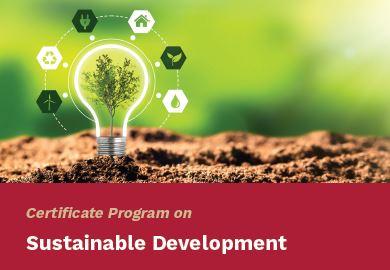
UNITAR Online Catalogue
CERTIFICATE PROGRAM ON SUSTAINABLE DEVELOPMENT

Multilateral Diplomacy
Accelerating SDG Implementation
Background
One of the biggest challenges today is to integrate sustainability into all areas of work in society. Sustainability is a management mode, which calls for the revision of traditional systems in the public and private sector and in the work of all social actors.
Beyond the 2030 Agenda approved by the United Nations General Assembly in 2015, society demands greater responsibility towards the planet and people; and greater involvement with the local environment in which we work and with future generations.
Event Objectives
- Professional Training for people working on sustainable development in private sector, civil society or public institutions.
- To contribute to Agenda 2030 implementation.
- To promote research, training and activities related to sustainability.
- Open the window for specific training tools and research activities on sustainable development.
Learning Objectives
- Knowledge and training on sustainability criteria to evaluate each of the sustainability areas: economic, social and environmental.
- Concentrate studies in fields included in each of the sustainability areas.
- To understand policies, strategies and models for sustainability in different settings (private sector companies, public institutions and civil society organizations).
- Build and develop skills and competencies to design and implement sustainability strategies
Content and Structure
1. Sustainability. What it means and what is the impact.
2. Agenda 2030. The history of the new agenda for development. A comparative approach MDGs & SDGs. Process of United Nations SDGs approval.
a) Dimensions of sustainability
b) Environmental
c) SocialEconomic
d) Non-tangibles
3. Areas: eradication of poverty; gender; access to justice; water and sanitation; oceans; health; education; employment
4. Actors: the role of Governments; Cities and Regions; Private Sector; Investors; Parliaments; CSOs; Foundations; Trade Unions; Academia; other stake-holders
5. Metrics: reporting system; mechanisms at local, national and international level
Methodology
- Online course.
- 96 hours (6,5hours/week) plus readings and final paper.
- Sessions online; fore discussions; final paper.
Additional Information
Representatives from academia, business, civil society, parliaments, government and international organizations will explain the sessions.